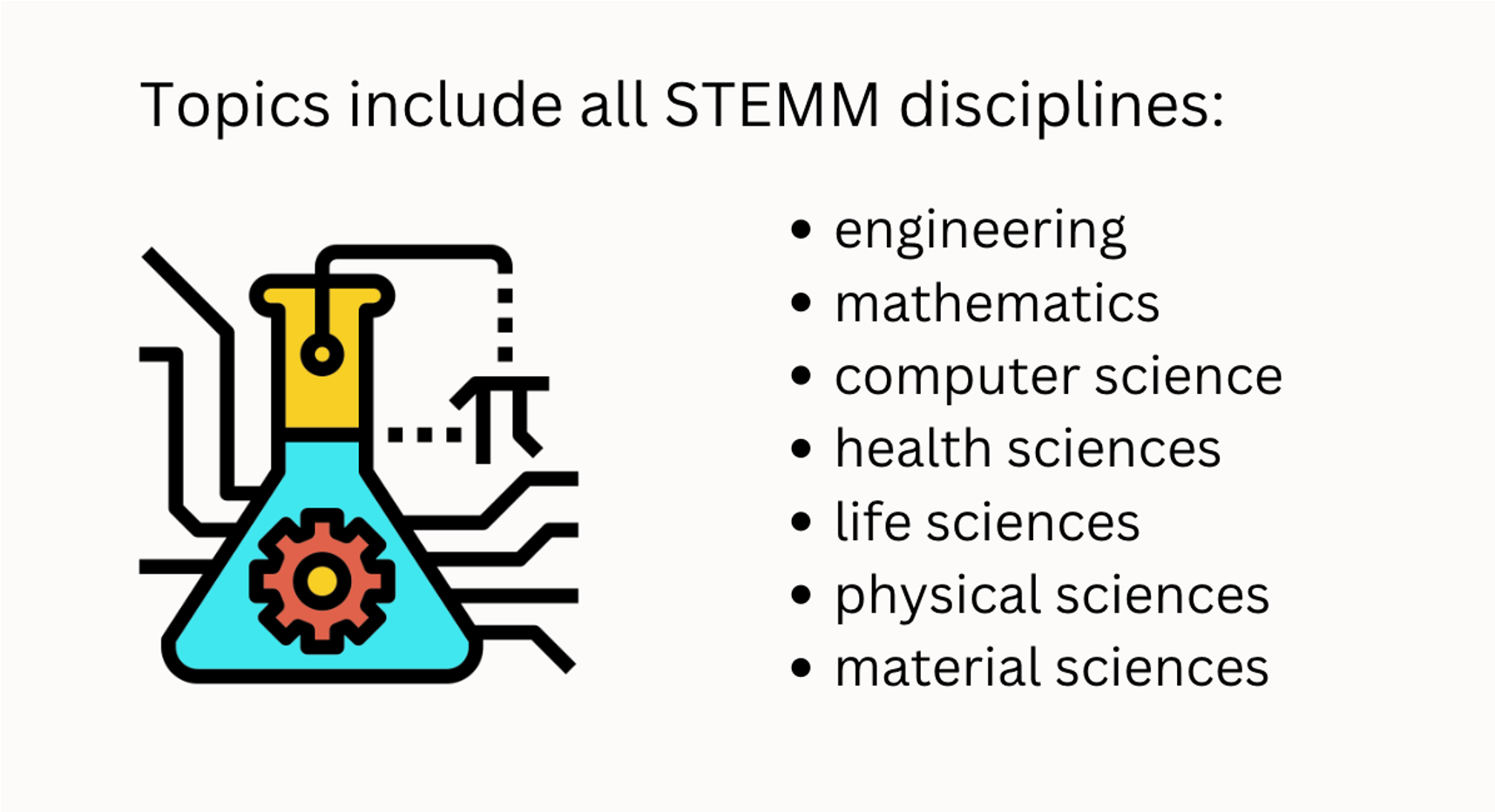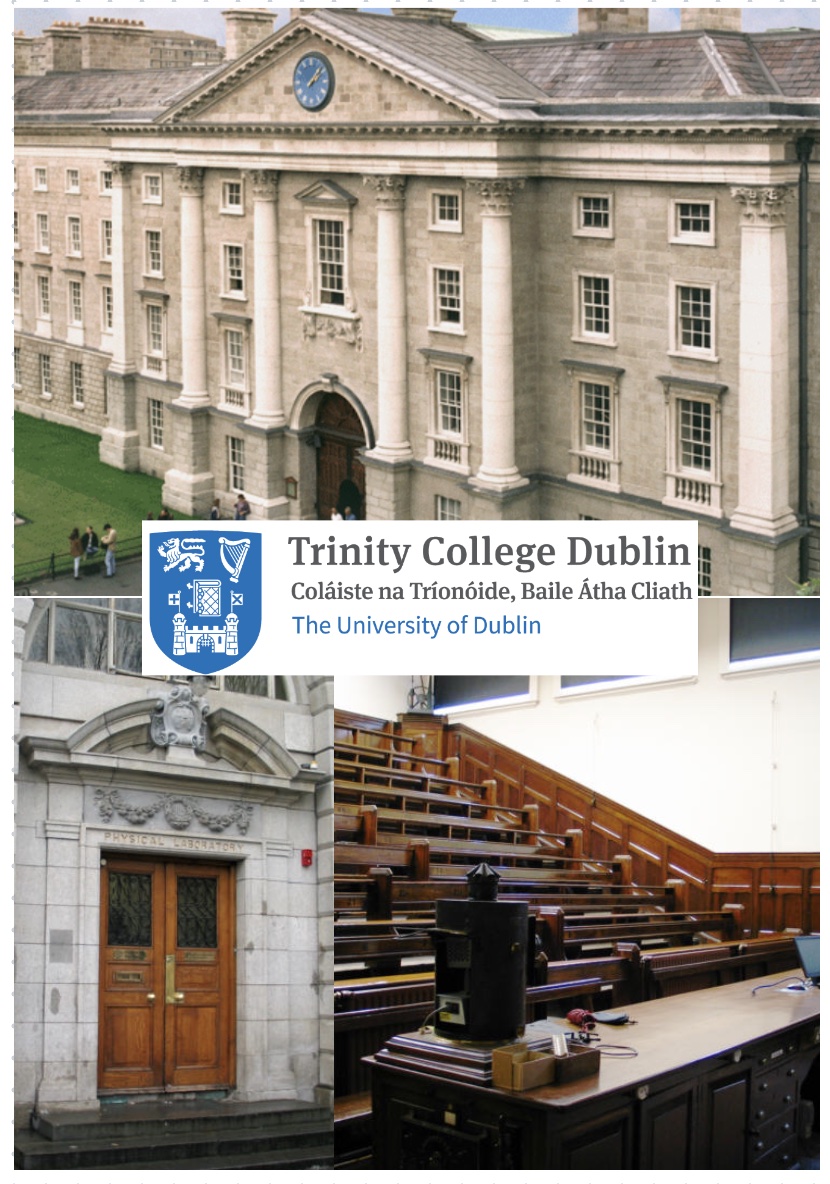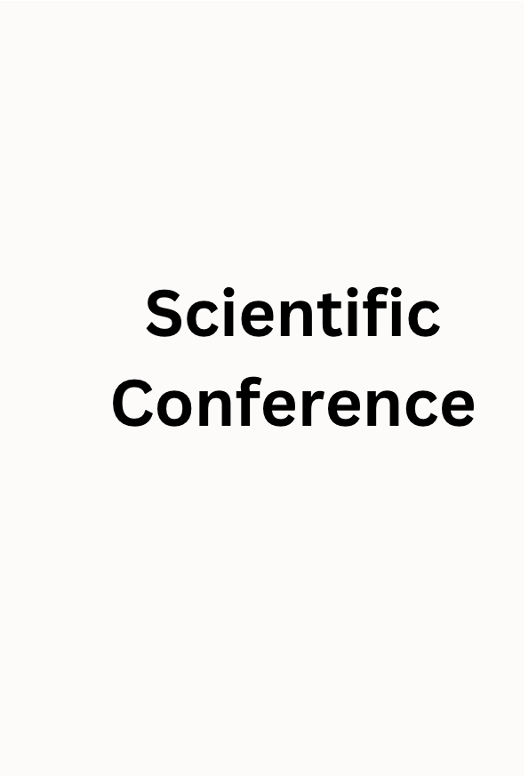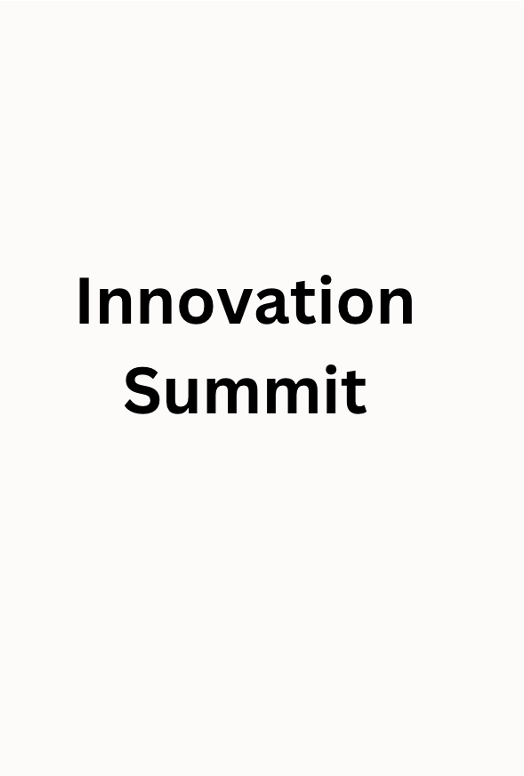IT’S HER TODAY! IT’S HER TOMORROW!
Women in STEMM Summit 2024
Register
The first summit of its kind, with universities and businesses in the UK and Ireland coming together to celebrate science, research and innovations by women across all disciplines in STEMM
Supporters
Become a Supporter of the Women in STEMM Summit 2024! For sponsorship opportunities please contact society@stemm.global
Celebrate International Women’s Day

in the company of like-minded female researchers and leaders

listen to inspirational career stories

join thought-provoking discussions
about the future role of women in STEMM disciplines.
Enjoy an interdisciplinary scientific programme of invited talks by female researchers of today!
Speakers


Journal of Lightwave Technology and Sensors. Her current research interests span both photonics and applications of photonic devices in engineering with a focus on fibre optics. Much of her work to date has been on improving the design and performance of optical fibre sensors with applications ranging from macro- to nanoscales. Some of the specific areas of her interests are: whispering gallery mode effects in microfiber resonators, plasmonic structures and photonic (liquid) crystal fibre sensors.

You can follow her on Twitter (@APuigCentelles) and LinkedIn

Amy holds both a Master's and a Ph.D. in Material Science, and is a chartered engineer. She is an investor in the deeptech team at Octopus Ventures, driving their thesis in advanced materials, manufacturing, and semiconductors.





Helen graduated from the University of Manchester in 1983 with a 1st class degree in Mathematics and Physics and with a PhD in experimental physics in 1986. she rapidly progressed as an academic, becoming the youngest professor of physics in decades at Manchester in 2003. She has pioneered many experimental techniques for the study of liquid crystals and devices, developing a deep understanding of their physical properties relevant to uses. She has invented devices including smart, switchable focus contact lenses, novel sensors and, most recently the first molecular auxetic material.
Helen has supervised more than 33 postgraduate students, collaborating with many industrial partners. She has co-edited textbooks for liquid crystals, published more than 185 papers in leading journals and given hundreds of conferences presentations. Her research achievements have been recognised by national and international awards by learned societies; the Hilsum and George Gray Medals of the British Liquid Crystal Society; the Holweck Prize, the Institute of Physics and French Physical Society Bilateral award, and the Rank Prize Lecture in 2016. Helen is very active in outreach and in issues around equality and inclusion. She was awarded an OBE in the Queen’s Birthday Honours 2009 that acknowledged her work on equality and inclusion in physics in addition to her scientific achievements. She won the 2018 Times Higher Education Outstanding Research Supervisor of the Year award, reflecting both her approach to mentoring early career researchers and to improving the environment for minorities. She was appointed as the Institute of Physics Advisor to Council for Inclusion and Diversity in November 2021.


She received her Master in Nuclear Physics at the Universita’ degli Studi di Perugia in Italy. After working for six years in industry, she returned to the academia and obtained her PhD in Plasma Physics at the University of Strathclyde (UK) in 2012. After her PhD, Silvia has worked at the University of Strathclyde, CERN (Switzerland), Diamond Light Source (UK) and, since 2020, at the University College London (UK). Her research aims to push the boundaries of x-ray imaging, in terms of information and acquisition modalities, to make it rich in content and easily accessible. Her recent work focuses on translating x-ray imaging techniques born at synchrotron facilities to compact light sources, from standard x-ray tubes to more innovative technologies such as inverse-Compton and laser-plasma sources. In all these cases, she adapts the imaging techniques to the unique properties of the sources, with application ranging from brain imaging to novel battery materials.



Audrey has also worked with Trinity’s Dean of Research on Trinity’s Innovation & Entrepreneurship strategy and Research Alliances.
In the 2000’s Audrey set up and ran Trinity’s High Performance Computing Centre, building research programmes and networks to accelerate computational science in Trinity following the joint acquisition of Ireland's first supercomputer with Queens in Belfast. Managing a team of 15 securing over €23m in funding from National funding agencies, European Commission, industry and philanthropy. During this time Audrey was co-founder of a Trinity spin out which currently employs 25 people in the data science and scientific modelling sector.

Tonia joined from the Association for Financial Markets in Europe (AFME) representing the pan-European wholesale capital markets industry.
In her previous role as an Associate Director, Tonia was leading AFME’s work programmes in ESG/Sustainable Finance and Financial Reporting for 3 years, helping to bring industry insights into the development of European, as well as global, policy in these thematic areas. In the past, Tonia has worked for large public accounting and consulting firms for more than 8 years. She has managed a wide spectrum of external assurance and consulting projects across both emerging and developed markets and has been specialising primarily in banking and capital markets sector.
Joined the Bank
September 2021
Education
Tonia holds a BBA in Marketing with a concentration in Accounting from the International Christian University in Kyiv. She is also a Certified Public Accountant in the US.

Research Interest: Emotional Intelligence in Education and its integration with Artificial Intelligence.



Abby has trained as a pilot, Rescue SCUBA Diver, and Emergency Medical Technician and is always searching for her next adventure. Abby has studied Mandarin Chinese, Russian, and Spanish and is passionate about all types of collaboration in the space industry, including international and private/public sectors. In her free time she creates educational videos and content on social media to excite more people about space and science. You can join Abby on her journey to become an astronaut by following her at @astronautabbyofficial.

Set up and ran the Credit Suisse Investment Bank multi-asset management business delivering a high return on hybrid capital with a wide spectrum of international institutional and retail clients.
Experienced Chairman, Non Executive Director and Chair of corporate governance, audit and risk committees.

Fondy is a one-stop shop cross-border payment platform for entrepreneurs who are building great businesses with sales in different countries. Multicurrency payments are more efficient when you can manage your payments, IBAN accounts, and payouts in one platform without any delays, extra charges for FX, and high fees for international transactions. Platforms and marketplaces can automate their split of payments and instant multiparty payouts in different currencies.


Her research interests lie in the field of nonlinear phenomena in theoretical physics and applied mathematics, with a particular focus on solitons and black holes. Her research has applications in high-energy physics, including cosmology, astrophysics, and particle physics, as well as in low-energy phenomena relevant to condensed matter physics and biophysicss. In 2022, she published a book in German titled 'Vordenkerinnen – Physikerinnen und Philosophinnen durch die Jahrhunderte' in collaboration with a philosopher. The book highlights the achievements of female scientists throughout history. In 2023, she edited a book on current trends in gravity, cosmology and astrophyiscs with contributions solely by female researchers entitled Gravity, Cosmology, and Astrophysic:
A Journey of Exploration and Discovery with Female Pioneers (Springer Nature, 2023). She is also currently the EDI co-chair of the Mathematics Department at UCL.


Ruth’s research is into the world of small, nanophysics. Continuing her thesis work, she conducts both experimental and theoretical research into the growth of Zinc Oxide nanowires. She also models the behaviour of two-dimensional Carbon Nanotube networks. She is committed to exploring the issues surrounding the inclusion of minoritized students in STEM, focusing on the building of communities within Science to support students (and faculty).


In 2023 Dr Tatsiana Mikulchyk was obtained an SFI-IRC Pathway Award to carry out her independent research on the development of panchromatic photopolymerisable glass for recording of holographic optical elements for Augmented Reality displays
Current research interests include holographic recording materials and their application for the development of diffractive optical elements by holographic patterning and two-photon lithography.

Pratheeba has published her work in various international journals, won awards for excellence in research and teaching, delivered several invited talks and has experience working for projects funded under the Economic and Social Research Council (ESRC), British Council’s Going Global Partnership Program, European Commission, Horizon 2020, and NIAS(India)-United Nations Development Programme (UNDP) policy research initiative. Her recent work on “Responsible intellectual property strategy for sustainability transition” published in the World Patent Information (WPI) journal has been featured as the top editor’s choice out of all the papers published by WPI in 2023. Prior to joining academia, she had three years of industrial experience in telecommunication and banking domains including experience working in multi-national and start-up environments.



Previously I was a Lecturer in Biostatistics with a joint position in the Department of Mathematics and the Department of Epidemiology and Biostatistics (School of Public Health) at Imperial College London. Before joining Imperial, I worked as a Statistician at the University of Cambridge where I also completed my BA in Mathematics, MPhil and PhD in Statistics.




BEng, MEng, MBBS, MRCS, PhD
Senior surgical trainee with a background in Medical Engineering and a PhD in Human factors in healthcare and medical device safety. I have experience in product research and development and development of human factor tools and pathway development for surgical and home use medical devices. During my PhD studies I worked closely with NIHR London IVD and collaborated with MHRA and other agencies with regards to medical device regulation. I have worked closely with MedTech and patients and are able to appreciate their requirements and challenges from both a medical and engineering point of view. I am involved in teaching and training of junior doctors and am a mentor for East of England surgical trainees.


With over 15 years of combined experience in pioneering R&D within prestigious academic institutions such as MIT, TCD, Tyndall and the University of Exeter, Dr Baldycheva is an internationally recognised female researcher, expert in emerging technologies, innovator, and entrepreneur in STEMM, being featured in Forbes and other media.
Dedicated and accomplished female academic with a strong background and a passion for fostering innovation in Nano-Engineering, Opto-Electronics and Photonics, AI and IoT. Combining a solid foundation in academic research and teaching with application and entrepreneurial focus, she aims to contribute to both academia and the business world by bridging the gap between theory and practice.
Dr Baldycheva’s dedication to advancing science and technology extends to her role as a Fellow, Board Member and Trustee of several esteemed Scientific Communities and Societies. Dr Baldycheva is a Fellow of Royal Microscopical Society (RMS) and a Fellow of the Royal Higher Education Academy (FHEA). She is a trustee and chair of the EPMS section of the RMS. At the RMS Prof Baldycheva also actively involved in the outreach activities to support and promote women in microscopy and related disciplines, as well as running and organising events for children.
She is also a founder and trustee of STEMM Global Scientific Society - the first international academic network helping scientists and innovators to connect and to establish collaborations on emerging technologies projects across STEMM disciplines. She is the founder and the main driver behind the Women in STEMM Initiative - It’s Her! https://itsher.today/ featured. Since 2019 she serves on the committee of the Jocelyn Bell Brunel PhD Scholarship to support physicists from under-represented groups.
Since 2015 Prof Baldycheva is an expert in Future and Emerging Technologies at the European Commission. She has published over 100 scientific publications to date with over 1000 citations. She is an editor in chief of the InSTEMM Journal, an associate editor of the Nature Scientific Reports and Discover Nano Journals, and a guest editor in a number of recognised scientific journals.
100+ Publications:130 peer-review & conference proceedings; 1 Patent; H-index: 20; Citations:1288
50+ Highlights in Press: national and international news (incl. Forbes and Forbes Tech Council).
69 Talks: 28 invited, 6 keynote and 4 plenary

Led over 100+ deals in the M&A context in the US, the UK and Europe
Advisor to the Board, support operationalization of the strategy
Scaled businesses from idea to multimillion revenue
Currently Senior Director, at Infosys
Ph.D. in International Economics

Sali is a lay panel member for Social Care Wales sitting on Fitness to Practise panels for registrants in the Social Care profession. She is also a ‘Mentor Mum’, coaching new mothers who are returning to the workplace following maternity leave.
In 2022 Sali was awarded an Honorary Fellowship from the College of Optometrists for her ‘Outstanding contribution to the Profession in Wales’.

https://www.imperial.ac.uk/electrochemical-systems-laboratory/

A keen advocate of sustainable product and service development, Colin aids impact driven founders and business leaders to plan and deliver robust technology strategies.
At Exeter Innovation, Colin is responsible for acceleration and knowledge exchange programme management, business support, and technology development support.

Bridging condensed matter physics and quantum optics, Professor Hess's research interests and his group's activities are in Quantum Nanophotonics, Active Metamaterials and Laser Physics and are currently focused on active (photonic, electronic and magnetic) metamaterials, quantum nano-photonics and spatio-temporal dynamics of (plasmonic and semiconductor) nanolasers.


Yang studied at Princeton University, where he received his Bachelor of Arts in Physics, with a Certificate in Applied Mathematics and a Certificate in Engineering, Summa cum Laude (Highest Honours, Phi-Beta-Kappa). He then obtained a Certificate in Advanced Mathematics (Tripos) at the University of Cambridge, with Distinction. He went on to receive his PhD in theoretical and mathematical physics from MIT. Yang continued with postdoctoral work in the University of Pennsylvania before joining University of Oxford as the FitzJames Fellow in Mathematics and then the UK STFC Advanced Fellow in theoretical physics.
Yang joined City in 2010 as Reader. He is currently Professor of Mathematics. He concurrently holds the Chang-Jiang Chair Professorship at NanKai University, China and jointly remains a Tutor and Lecturer at Merton College, Oxford where he taught since 2005. In 2021, he became Fellow of the London Institute of Mathematical Sciences at the Royal Institution, and is thus splitting his time.

His PhD is in plant genetics, earned after serving as a Peace Corps volunteer in Nepal. Following a lengthy career in international development, he taught biology in secondary school, becoming familiar with the lack of diversity found in the standard curriculum, which did not reflect the diversification of students attending public schools nor did it address the needs of underrepresented students in the life sciences.
From this interest, came studies on courageous science, including environmentalist Rachel Carson and plant explorers Nikolai Vavilov and Calvin Sperling. He has also published a recent article on women naturalists and implications of their work for secondary and undergraduate biology courses. As regards laboratory practice, he has remained dedicated to microscopy since his dissertation on cytogenetics of trisomy in maize. Now he is documenting the global utility of microscopy, its centrality combatting illness, applications in forensic science, and for investigating biodiversity.
His presentation today focuses on recognizing in barriers to research imposed upon or otherwise attributed to minority and underrepresented groups, concluding with advances in microscopy.
Programme
Scientific Conference (07-08 March 2024)
Interdisciplinary Scientific programme of powerful talks and poster
presentations of all research and innovations by female scientists and
engineers in the UK and Ireland


Keynote
Role Models in STEMM from academia
Scientific Sessions
Oral and poster presentations across STEMM disciplines
You can submit an abstract for:
-
Oral Presentation (London or Dublin)
-
Poster Presentation (London or Dublin)
-
Online Poster (see details)
Innovation Summit (07 March 2024)
 Panels
Panels
thought-provoking discussions with practicioners from business, academia and government

Keynote
Speakers representing business and government

Workshops
focused on how to create an inclusive workplace through promotion of innovation and maximizing talent
-
Why we don’t have equal representation of women in STEMM?
-
Research and Innovation: Showcase recent research results and inventions done by women.
-
Career Advancement: Inspirational Career Stories. What is core to success? Critical milestones to consider.
-
What government is doing today to strengthen science and business innovation ? How STEMM researchers can benefit from that?
 Networking
Networking
to build supportive culture to drive each individual maximum performance and contribution
 Celebration
Celebration
of International Womens Day in a company of like minded business and scientific leaders

Locations
London Venue

Institute of Physics (IOP)
Institute of Physics
37 Caledonian Road
London N1 9BU
UK
Get Directions
Dublin Venue

Trinity College Dublin
Physics Lecture Theatre
Fitzerald Building
Dublin
Dublin City
Ireland
Get Directions
Programme and Organising Committee

With over 15 years of combined experience in pioneering R&D within prestigious academic institutions such as MIT, TCD, Tyndall and the University of Exeter, Dr Baldycheva is an internationally recognised female researcher, expert in emerging technologies, innovator, and entrepreneur in STEMM, being featured in Forbes and other media.
Dedicated and accomplished female academic with a strong background and a passion for fostering innovation in Nano-Engineering, Opto-Electronics and Photonics, AI and IoT. Combining a solid foundation in academic research and teaching with application and entrepreneurial focus, she aims to contribute to both academia and the business world by bridging the gap between theory and practice.
Dr Baldycheva’s dedication to advancing science and technology extends to her role as a Fellow, Board Member and Trustee of several esteemed Scientific Communities and Societies. Dr Baldycheva is a Fellow of Royal Microscopical Society (RMS) and a Fellow of the Royal Higher Education Academy (FHEA). She is a trustee and chair of the EPMS section of the RMS. At the RMS Prof Baldycheva also actively involved in the outreach activities to support and promote women in microscopy and related disciplines, as well as running and organising events for children.
She is also a founder and trustee of STEMM Global Scientific Society - the first international academic network helping scientists and innovators to connect and to establish collaborations on emerging technologies projects across STEMM disciplines. She is the founder and the main driver behind the Women in STEMM Initiative - It’s Her! https://itsher.today/ featured. Since 2019 she serves on the committee of the Jocelyn Bell Brunel PhD Scholarship to support physicists from under-represented groups.
Since 2015 Prof Baldycheva is an expert in Future and Emerging Technologies at the European Commission. She has published over 100 scientific publications to date with over 1000 citations. She is an editor in chief of the InSTEMM Journal, an associate editor of the Nature Scientific Reports and Discover Nano Journals, and a guest editor in a number of recognised scientific journals.
100+ Publications:130 peer-review & conference proceedings; 1 Patent; H-index: 20; Citations:1288
50+ Highlights in Press: national and international news (incl. Forbes and Forbes Tech Council).
69 Talks: 28 invited, 6 keynote and 4 plenary


Yang studied at Princeton University, where he received his Bachelor of Arts in Physics, with a Certificate in Applied Mathematics and a Certificate in Engineering, Summa cum Laude (Highest Honours, Phi-Beta-Kappa). He then obtained a Certificate in Advanced Mathematics (Tripos) at the University of Cambridge, with Distinction. He went on to receive his PhD in theoretical and mathematical physics from MIT. Yang continued with postdoctoral work in the University of Pennsylvania before joining University of Oxford as the FitzJames Fellow in Mathematics and then the UK STFC Advanced Fellow in theoretical physics.
Yang joined City in 2010 as Reader. He is currently Professor of Mathematics. He concurrently holds the Chang-Jiang Chair Professorship at NanKai University, China and jointly remains a Tutor and Lecturer at Merton College, Oxford where he taught since 2005. In 2021, he became Fellow of the London Institute of Mathematical Sciences at the Royal Institution, and is thus splitting his time.


Led over 100+ deals in the M&A context in the US, the UK and Europe
Advisor to the Board, support operationalization of the strategy
Scaled businesses from idea to multimillion revenue
Currently Senior Director, at Infosys
Ph.D. in International Economics


Bridging condensed matter physics and quantum optics, Professor Hess's research interests and his group's activities are in Quantum Nanophotonics, Active Metamaterials and Laser Physics and are currently focused on active (photonic, electronic and magnetic) metamaterials, quantum nano-photonics and spatio-temporal dynamics of (plasmonic and semiconductor) nanolasers.













